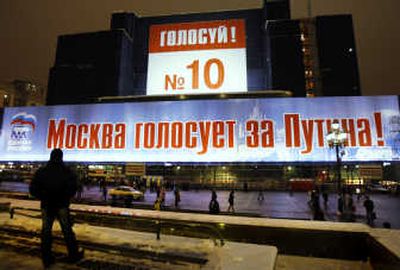In Russia election, Putin the sole issue

MOSCOW – Russia began voting today in a parliamentary election where the only question is whether President Vladimir Putin’s party will win merely a strong majority of seats or a gargantuan, crushing share.
The election follows months of increasingly acidic rhetoric aimed against the West and efforts, by law and by truncheon, to stifle opponents.
A huge win for Putin’s United Russia party could pave the way for him to stay at the country’s helm once his presidential term expires in the spring. The party casts the election as essentially a referendum on Putin’s nearly eight years in office. Many of its campaign banners that festoon the capital read “Moscow is voting for Putin.”
Putin is constitutionally prohibited from running for a third consecutive term as president in March. But he clearly wants to keep his hand on Russia’s levers of power and has raised the prospect of becoming prime minister; many supporters have suggested his becoming a “national leader,” though what duties and powers that would entail are unclear.
He said that a strong showing for the party today would give him the moral right to ensure that politicians in power continue his policies. Recent opinion polls suggest the party could win up to 80 percent of seats.
The voting started in the Far Eastern regions of Chukotka and Kamchatka while Muscovites were preparing for bed late Saturday. It concludes in the western exclave of Kaliningrad at 10 a.m. PST today.
The vote is the first national ballot under new election laws that have been widely criticized as marginalizing opposition forces. All the seats will be awarded proportionately to how much of the vote a party receives; in previous elections, half the seats were distributed among candidates contesting a specific district, which allowed a few mavericks to get in.
The new laws also say a party must receive at least 7 percent of the national vote to get any seats – up from the previous 5 percent. A poll by the All-Russia Public Opinion Research Center in mid-November showed the Communists and two other parties hovering near the cutoff point.
Opposition parties, meanwhile, claim authorities have confiscated campaign materials and that the managers of halls have refused to rent them out for opposition meetings. Police have violently broken up opposition rallies – most recently in Moscow and St. Petersburg last weekend – and national television gives the parties hardly any coverage.
Garry Kasparov, the former world chess champion who has become one of the most prominent opposition leaders, called the election a “farce” Friday, a day after being released from jail following his arrest in the weekend protests.
In contrast to the near invisibility of the opposition on television, Putin’s speeches to supporters have been broadcast in full and repeated throughout evening newscasts. On Thursday, the noon news program on the country’s largest TV network led with a paid Putin address to the nation in which he called on voters to cast ballots for United Russia. It was repeated on other channels throughout the day, raising criticism that he was misusing state resources for open campaigning.
Today’s vote “meets none of the criteria of a free, fair and democratic election. In effect, it is not even an election,” Andrei Illarionov, a former adviser to Putin, wrote in a commentary for the Cato Institute think tank.